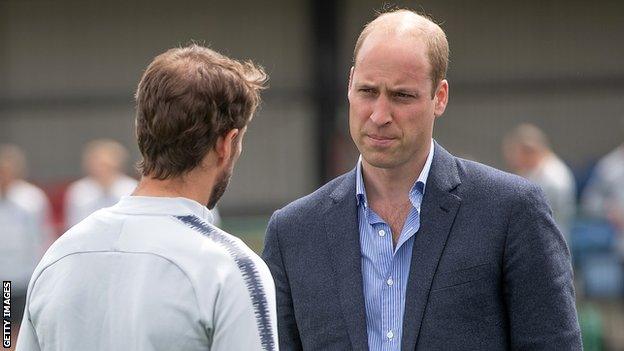Mental health: PFA says more football players are seeking help
- Published

FA President Prince William has criticised football clubs for for their attitude towards the mental health of players
A growing number of players are seeking help from the Professional Footballers' Association (PFA) for mental health problems, according to new figures.
New data shows that 438 current and former professionals accessed therapy in 2018, 278 more than two years ago.
The union's head of welfare, Michael Bennett, suggests more current players are coming forward now.
"Once you would never show any weakness, but they now realise it's not weak to talk about things," he said.
The PFA's new figures come less than a week after Prince William, the Duke of Cambridge and President of the Football Association, criticised football clubs for their attitude towards players' mental health.
"The issues have always been there," added former England youth international Bennett, who has run the PFA's player welfare department since 2011.
"Dealing with injuries, transition in and out of the game, going on loan and feeling isolated, foreign players being lonely and so on, and then you have problems related to money worries or addiction.
"But they have perhaps been a little bit under the radar and too many people have suffered in silence in the past.
"Now, I hope, people realise you can ask for help and help is available."
Several former and current high-profile players have spoken of their battles with mental health issues, including Tottenham and England full-back Danny Rose, former England winger Aaron Lennon and the now-retired striker Stan Collymore.
Gambling the 'new challenge'
Although he admits there is more awareness among football clubs regarding mental health, Bennett highlighted that other issues, such as gambling, cause new concerns.
"It used to be betting shops and card schools but now it's virtual casinos and gambling on your phone," he continued.
"It's everywhere now and it can get out of hand quite quickly. Everyone thinks young players are on 拢5,000 a week, so it doesn't matter, but it's more like 拢500 a week in Leagues One and Two and they can get in trouble because they are not millionaires.
"You only have to tick a box to say you're 18 and away you go. It doesn't seem like real money and it's a big issue. We are doing a lot of work on this with Sporting Chance and [problem-gambling experts] EPIC."
In December, Britain's biggest gambling companies confirmed plans to effectively ban television betting adverts during pre-watershed live sport.
The Remote Gambling Association (RGA), made up of Britain's biggest betting companies including Bet365, Ladbrokes and Paddy Power, voluntarily agreed to the ban.
Former Manchester City and Northern Ireland player Jeff Whitley, who is a member of the welfare team at the PFA, says gambling provides a "new challenge" for the sport.
Whitley, who suffered from his own drink and drug addiction during his career, said: "With gambling, you don't have to go to the bookies; it's a very secretive addiction. People just need their mobile phones.
"It's different to alcohol or drugs, which you can see or smell when players come into the club.
"With gambling, people can put a mask on. It can be months before anyone would know they're really struggling."